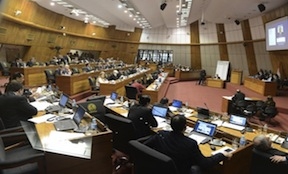In the wake of recent rebel actions, Paraguay’s legislature has approved the creation of a national intelligence system, but it remains to be seen whether this body will give adequate attention to organized crime issues, let alone neutralize the insurgent threat.
The creation of the agency was approved unanimously by Paraguay’s House of Representatives on July 10, reported EFE. The bill, which had already been approved by the Senate, is now awaiting consideration from President Horacio Cartes.
If approved by the president, the proposed agency would be responsible for collecting and analyzing information to facilitate coordination on national security issues. In addition, the body would process information on agriculture, health, education and other sectors, reported ABC Color. The head of the agency would be appointed by the president.
The bill’s sponsor, Representative Hugo Rubin, reportedly told the legislature the creation of a national intelligence system was urgent given the country’s current security situation.
The passage of the law follows two recent high-profile kidnappings allegedly carried out by guerrilla group the Paraguayan People’s Army (EPP), as well as an attack on an electricity tower attributed to the group that left thousands without power. The 16-year-old son of ranchers was kidnapped by the EPP in April this year, and a police officer kidnapped on July 5 is also believed to be a hostage of the guerrilla group.
InSight Crime Analysis
Although the national intelligence system will collect information on a variety of issues, and was promoted by the previous president, Fernando Lugo, the passage of the law could also be linked to recent guerrilla attacks and the perception that the EPP is a growing threat.
The country’s lack of a centralized intelligence system has likely undermined the government’s campaign against the EPP, a group thought to have fewer than one hundred members. There are currently thousands of military personnel stationed in the eastern departments of San Pedro, Amambay and Concepcion, where the EPP operates, but the recent attacks indicate they have had little success combating the guerrillas.
SEE ALSO: Coverage of Paraguay
Despite the government’s focus on the EPP, the group is arguably not Paraguay’s biggest threat; any national intelligence agency will need to give significant attention to drug trafficking as well. In addition to being South America’s largest marijuana producer, Paraguay is also a transshipment point for cocaine headed to Brazil and the European market. Brazilian criminal groups the First Capital Command (PCC) and Red Command (CV) are known to operate in Paraguay, and there have been indications of increasingly sophisticated local drug trafficking groups emerging.

